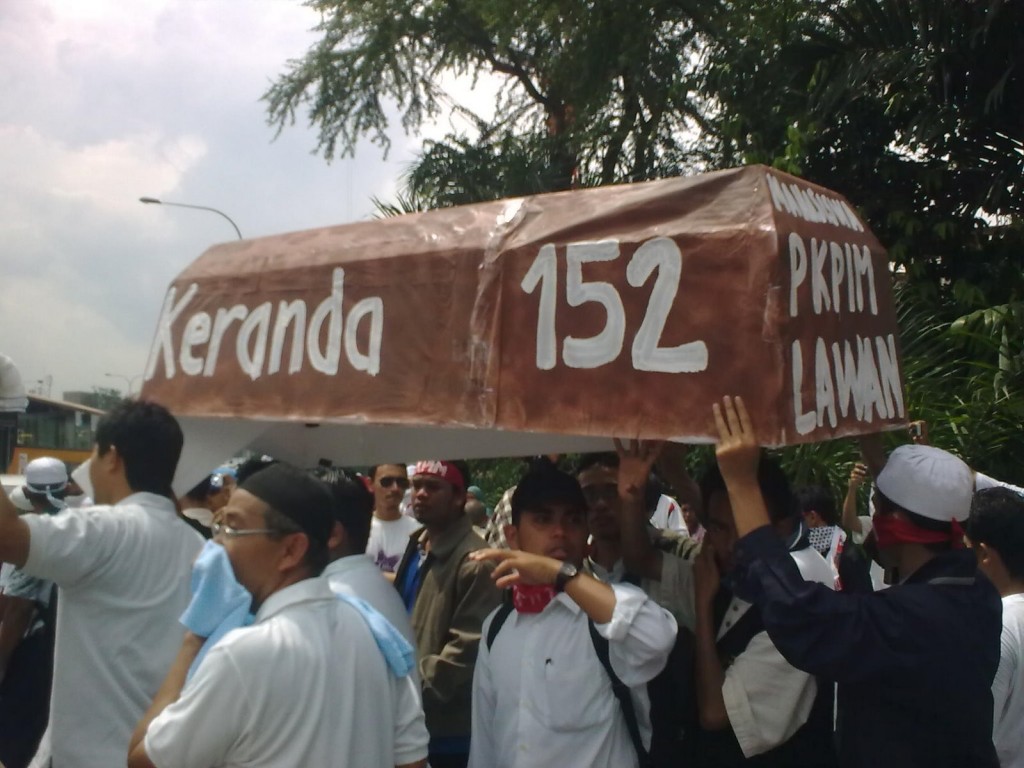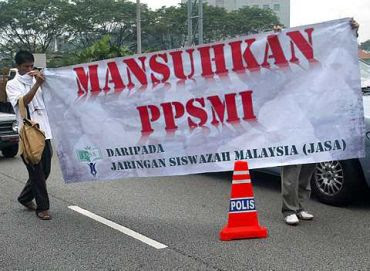
Imran Mustafa
We read with interest the article entitled “Abolishing PPSMI is not the answer” by Datin Noor Azimah Abdul Rahim (September 10, 2012), in particular, the fallacious arguments made in the name of science policy. Before going into the details of the argument, it is best to remind oneself what the term “PPSMI” means Pengajaran dan Pembelajaran Sains dan Matematik dalam bahasa Inggeris or “The Teaching and Learning of Science and Mathematics in English”. What this obviously implies is that everyone, regardless of background or first language, is, have been and will always be obligated to learn the two subjects, science and mathematics, in English.
I. Therefore, the objection that, “By abolishing the policy, the DPM is preventing many of our children from learning the knowledge in a language they are most comfortable with, a belief UNESCO has always advocated” needs to be backed up by empirical data, that is to say, there needs to be concrete data that the majority, if not totality, of children population are “most comfortable” with English. It is only after this has been established, not before, that that the UNESCO report, which promotes education in the mother tongue, can be employed.
The implication of this is enormous, as what it points to is a complete and systematic study of both the linguistic preference and actual ability of our children, which has been attempted by the Ministry. Of course there can be no complete, i.e. involving every single child, study on the matter, but a statistical sample which is representative of the entire population is sufficient for the purposes of constructing policy.
Therefore, unless proponents of PPSMI can bring evidence of the same calibre, breadth and scale which is contrary to the findings of the Ministry, this entire notion not only fails, it is also ironically unscientific. It has to be stressed that the evidence that needs to be given needs to have the same calibre, which means that the sample used must also be representative of the population for instance by taking a balanced account of various socio-economic, cultural and linguistic discrepancies between urban and rural students, the distribution of teachers across states and subjects and the differing standards in infrastructure amongst numerous schools. Failure to take these factors into account will render the study biased and therefore, cannot be said to be scientifically valid for the entire population of the country. Anyone who has done any kind of basic statistical research will know this.
This is not to say that students who wish to pursue science and mathematics in English, as it is their mother tongue, should not be allowed to do so. But the whole point of PPSMI is that it “forces” everyone to study science and mathematics in English, which is certainly anathema to the spirit of the UNESCO suggestion.
II. A further objection then follows, “The objective of PPSMI is to learn the knowledge in science and mathematics and not to learn English. The DPM appears to have failed to understand this distinction.”
The word “science”, etymologically, comes from the Latin word scientia, which literally translates as “knowledge” (this is the reason why the “religious sciences” is acceptable, despite the fact that the field does not strictly employ the scientific method). What the word “science”, as it is used here, has the following meaning according to the Oxford Online Dictionary,
“The intellectual and practical activity encompassing the systematic study of the structure and behaviour of the physical and natural world through observation and experiment”
What is noteworthy here is that nowhere in this definition is the term ‘science’ necessarily linked to a language, nor does the definition of mathematics, which is given as follows,
“The abstract science of number, quantity, and space, either as abstract concepts (pure mathematics), or as applied to other disciplines such as physics and engineering (applied mathematics)”
Therefore, the teaching of science and mathematics in no way point to a policy favouring a particular language, so long as the intellectual and practical activity which allows for the systematic study of Nature takes place. Hence, the so-called distinction that was made does not exist, as the purpose of any and all science and mathematics education policy has always been the learning of science and mathematics, and not of any language.
It is also worth noting that while science policy and education policy are intimately linked, they serve different purposes. Education on the sciences are linked to the “promotion of science”, rather than science itself. Science policy is, strictly speaking, the purview of the Ministry of Science, Technology and Innovation, which is, interestingly enough, a whole separate Ministry to both the Ministry of Education and Ministry of Higher Education. Of course the promotion of science and mathematics needs careful collaboration between these three Ministries, but it is a mistake to subsume science policy, which also includes research funding, allocations for innovation etc., to the Ministry of Education alone.
Therefore, the question of the “promotion of science”, is a far broader and needs to be thought in a more comprehensive manner. What is required is not only a rethinking of the teaching of science and mathematics, but the whole culture and attitude towards knowledge that we Malaysians have. Science is, after all, a study of Nature. And to study Nature, one has to be interested in Nature intrinsically, rather than viewing nature in terms of utility alone.
III. On the issue of science policy, perhaps our learned community in Malaysia such as PAGE can take a leaf out of the work done by non governmental organisations such as Newton’s Apple in the United Kingdom, whose mission is specifically to bridge the gap between science and policy. They run, for example, Project Faraday, which is “aimed to support excellent, interactive science teaching and learning by developing inspirational ‘exemplar’ designs for science provision”, in addition to introductory science policy workshops for budding scientists such as myself which allows us to understand and be involved with the crafting of science policy. Such programmes are intimately linked to the government and indeed, help the government in their efforts to create a proactive and sustainable science policy by linking scientists all over the UK with various Learned Societies, such as the Institute of Physics in our case, to both promote and enhance scientific activity in the country.
We therefore applaud this move to seriously think about promoting science and science policy in general, but we do not believe that the answer lie in solely blaming the education of science and mathematics in languages other than English. To properly assess the situation, a more robust and comprehensive look at the entire culture and attitude towards science and knowledge is required, and we believe that this democratic process needs to be more visible in Malaysia.
In conclusion, then, the teaching of science and mathematics need not be in English, for all the reasons mentioned above. As the central contention of PPSMI is that science and mathematics needs to be taught in English, the abolishment of such a policy is in not anathema to the both the spirit and working of science and mathematics. The issue of promoting science and mathematics needs to be properly and confronted separately and comprehensively, and this requires a rethinking of many policy areas, not only the teaching of science and mathematics.

Leave a Reply